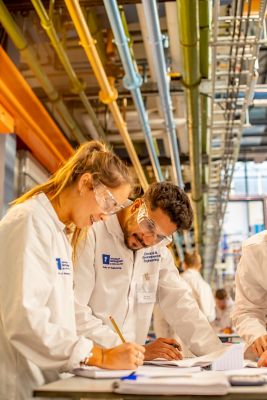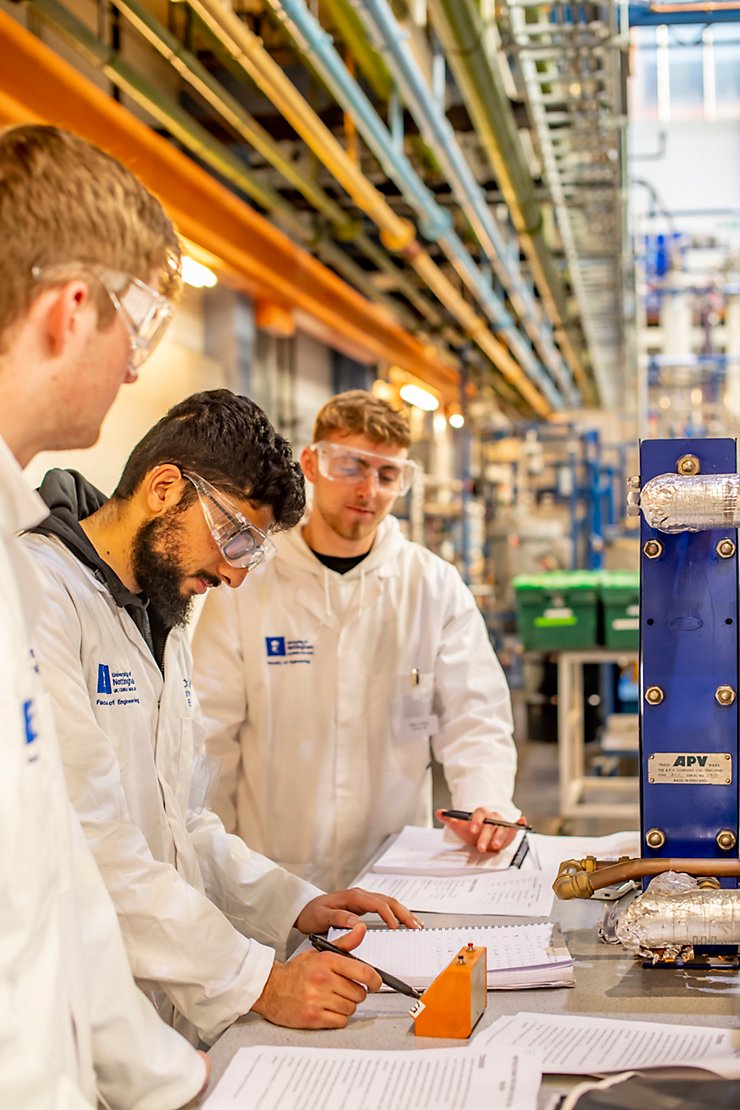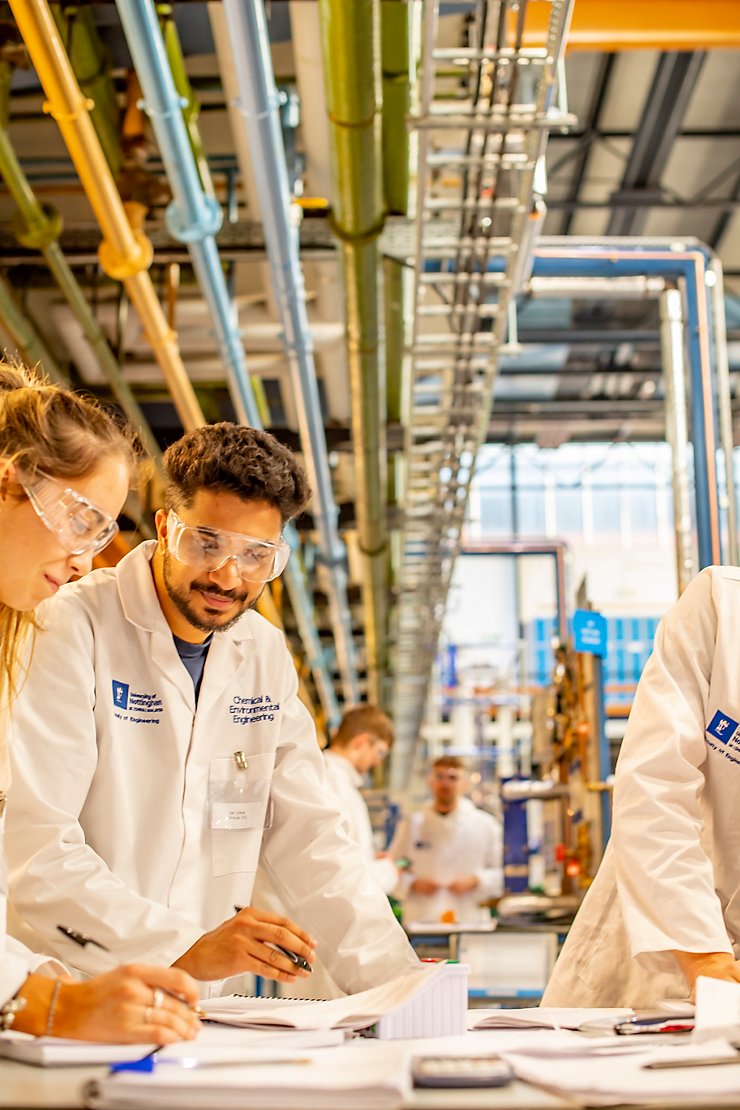Teaching methods
- Group study
- Independent study
- Lab sessions
- Lectures
- Practical classes

University Park Campus, Nottingham, UK
We're busy updating our undergraduate prospectus for the 2026/27 academic year. The information here might change, so keep an eye out for updates by the end of April 2025.
| Qualification | Entry Requirements | Start Date | UCAS code | Duration | Fees |
|---|---|---|---|---|---|
| BEng Hons | AAA | September 2026 | H810 | 3 years full-time | £9,535* |
| Qualification | Entry Requirements | Start Date | UCAS code | Duration | Fees |
|---|---|---|---|---|---|
| BEng Hons | AAA | September 2026 | H810 | 3 years full-time | £9,535* |
This course is accredited by the IChemE (Institution of Chemical Engineers).
This course is accredited by the IOM3 (Institute of Materials, Minerals and Mining).
This course is accredited by the IChemE (Institution of Chemical Engineers).
This course is accredited by the IOM3 (Institute of Materials, Minerals and Mining).
One of HL6 in Mathematics Analysis and Approaches, HL6 in Mathematics Applications and Interpretation or SL7 in Mathematics Analysis and Approaches plus HL6 in one of Physics or Chemistry
6.0 (no less than 5.5 in any element)
As well as IELTS (listed above), we also accept other English language qualifications. This includes TOEFL iBT, Pearson PTE, GCSE, IB and O level English. Check our English language policies and equivalencies for further details.
For presessional English or one-year foundation courses, you must take IELTS for UKVI to meet visa regulations.
If you need support to meet the required level, you may be able to attend a Presessional English for Academic Purposes (PEAP) course. Our Centre for English Language Education is accredited by the British Council for the teaching of English in the UK.
If you successfully complete your presessional course to the required level, you can then progress to your degree course. This means that you won't need to retake IELTS or equivalent.
Check our country-specific information for guidance on qualifications from your country
A in Maths and A in either chemistry or physics.
GCSE English grade 4 (C).
General studies, critical thinking and citizenship studies are not accepted.
All candidates are considered on an individual basis and we accept a broad range of qualifications. The entrance requirements below apply to 2023 entry.
Please note: Applicants whose backgrounds or personal circumstances have impacted their academic performance may receive a reduced offer. Please see our contextual admissions policy for more information.
We recognise that applicants have a wealth of different experiences and follow a variety of pathways into higher education.
Consequently, we treat all applicants with alternative qualifications (besides A-levels and the International Baccalaureate) on an individual basis and we gladly accept students with a whole range of less conventional qualifications including:
The entry requirements for alternative qualifications can be quite specific; for example, you may need to take certain modules and achieve a specified grade in those modules. Please contact us to discuss the transferability of your qualification. Please also see the alternative qualifications page for more information.
RQF BTEC Nationals
For those considered for year one entry, our typical offer is as follows:
RQF Level 3 BTEC National Extended Diploma in Engineering – D*DD including Distinction in units:
RQF Level 3 BTEC National Diploma in Engineering or Science and A Levels – D*D + A in A Level Maths
RQF Level 3 BTEC National Extended Certificate and A Levels – D + A in A Level Maths and A in A Level Physics or Chemistry
Access to HE Diploma
Access to HE Diploma 36 Level 3 credits at Distinction (to include a minimum of 15 Level 3 credits at Distinction in Mathematics and 15 Level 3 credits at Distinctions in Engineering/Science units) and 9 Level 3 credits at Merit.
If you have already achieved your EPQ at grade A you will automatically be offered one grade lower in a non-mandatory A level subject. If you are still studying for your EPQ you will receive the standard course offer, and also an alternate offer with a condition of one grade lower in a non-mandatory A level subject if you achieve an A grade in your EPQ. If you qualify for a contextual offer, your EPQ will be taken into consideration and the appropriate adjustment will be made to your offer. Please note that if you qualify for an enhanced contextual offer, your EPQ will not be taken into consideration as we are unable to make any further adjustments to your offer.
At the University of Nottingham, we have a valuable community of mature students and we appreciate their contribution to the wider student population. You can find lots of useful information on the mature students webpage.
International students must have valid UK immigration permissions for any courses or study period where teaching takes place in the UK. Student route visas can be issued for eligible students studying full-time courses. The University of Nottingham does not sponsor a student visa for students studying part-time courses. The Standard Visitor visa route is not appropriate in all cases. Please contact the university’s Visa and Immigration team if you need advice about your visa options.
A in Maths and A in either chemistry or physics.
GCSE English grade 4 (C).
General studies, critical thinking and citizenship studies are not accepted.
One of HL6 in Mathematics Analysis and Approaches, HL6 in Mathematics Applications and Interpretation or SL7 in Mathematics Analysis and Approaches plus HL6 in one of Physics or Chemistry
All candidates are considered on an individual basis and we accept a broad range of qualifications. The entrance requirements below apply to 2023 entry.
Please note: Applicants whose backgrounds or personal circumstances have impacted their academic performance may receive a reduced offer. Please see our contextual admissions policy for more information.
We recognise that applicants have a wealth of different experiences and follow a variety of pathways into higher education.
Consequently, we treat all applicants with alternative qualifications (besides A-levels and the International Baccalaureate) on an individual basis and we gladly accept students with a whole range of less conventional qualifications including:
The entry requirements for alternative qualifications can be quite specific; for example, you may need to take certain modules and achieve a specified grade in those modules. Please contact us to discuss the transferability of your qualification. Please also see the alternative qualifications page for more information.
RQF BTEC Nationals
For those considered for year one entry, our typical offer is as follows:
RQF Level 3 BTEC National Extended Diploma in Engineering – D*DD including Distinction in units:
RQF Level 3 BTEC National Diploma in Engineering or Science and A Levels – D*D + A in A Level Maths
RQF Level 3 BTEC National Extended Certificate and A Levels – D + A in A Level Maths and A in A Level Physics or Chemistry
Access to HE Diploma
Access to HE Diploma 36 Level 3 credits at Distinction (to include a minimum of 15 Level 3 credits at Distinction in Mathematics and 15 Level 3 credits at Distinctions in Engineering/Science units) and 9 Level 3 credits at Merit.
If you have already achieved your EPQ at grade A you will automatically be offered one grade lower in a non-mandatory A level subject. If you are still studying for your EPQ you will receive the standard course offer, and also an alternate offer with a condition of one grade lower in a non-mandatory A level subject if you achieve an A grade in your EPQ. If you qualify for a contextual offer, your EPQ will be taken into consideration and the appropriate adjustment will be made to your offer. Please note that if you qualify for an enhanced contextual offer, your EPQ will not be taken into consideration as we are unable to make any further adjustments to your offer.
We make contextual offers to students who may have experienced barriers that have restricted progress at school or college. Our standard contextual offer is usually one grade lower than the advertised entry requirements, and our enhanced contextual offer is usually two grades lower than the advertised entry requirements. To qualify for a contextual offer, you must have Home/UK fee status and meet specific criteria – check if you’re eligible.
An Engineering and Physical Sciences foundation year is available for those who are not taking the required subjects
At the University of Nottingham, we have a valuable community of mature students and we appreciate their contribution to the wider student population. You can find lots of useful information on the mature students webpage.
On this course, you can apply to study abroad at one of our partner institutions or at University of Nottingham China or University of Nottingham Malaysia.
If you are successful in applying to study abroad, you will get the opportunity to broaden your horizons and enhance your CV by experiencing another culture. Teaching is typically in English, but there may be opportunities to study in another language if you are sufficiently fluent.
You can choose to study similar modules to your counterparts in the UK or expand your knowledge by taking other options.
The school you are joining may also have additional study abroad options available. Please visit the school website for more information.
Please note:
In order to study abroad you will need to achieve the relevant academic requirements as set by the university and meet the selection criteria of both the university and the partner institution. The partner institution is under no obligation to accept you even if you do meet the relevant criteria.
If your course does not have a compulsory placement, integrated year in industry or compulsory year abroad where there is already an opportunity to undertake a work placement as part of that experience, you may be able to apply to undertake an optional placement year. While it is the student’s responsibility to find and secure a placement, our Careers and Employability Service will support you throughout this process. Contact placements@nottingham.ac.uk to find out more.
The school/faculty you are joining may also have additional placement opportunities. Please visit the school/faculty website for more information.
Please note:
In order to undertake an optional placement year, you will need to achieve the relevant academic requirements as set by the university and meet any requirements specified by the placement host. There is no guarantee that you will be able to undertake an optional placement as part of your course.
Please be aware that study abroad, compulsory year abroad, optional placements/internships and integrated year in industry opportunities may change at any time for a number of reasons, including curriculum developments, changes to arrangements with partner universities or placement/industry hosts, travel restrictions or other circumstances outside of the university’s control. Every effort will be made to update this information as quickly as possible should a change occur.
On this course, you can apply to study abroad at one of our partner institutions or at University of Nottingham China or University of Nottingham Malaysia.
If you are successful in applying to study abroad, you will get the opportunity to broaden your horizons and enhance your CV by experiencing another culture. Teaching is typically in English, but there may be opportunities to study in another language if you are sufficiently fluent.
You can choose to study similar modules to your counterparts in the UK or expand your knowledge by taking other options.
The school you are joining may also have additional study abroad options available. Please visit the school website for more information.
Please note:
In order to study abroad you will need to achieve the relevant academic requirements as set by the university and meet the selection criteria of both the university and the partner institution. The partner institution is under no obligation to accept you even if you do meet the relevant criteria.
If your course does not have a compulsory placement, integrated year in industry or compulsory year abroad where there is already an opportunity to undertake a work placement as part of that experience, you may be able to apply to undertake an optional placement year. While it is the student’s responsibility to find and secure a placement, our Careers and Employability Service will support you throughout this process. Contact placements@nottingham.ac.uk to find out more.
The school/faculty you are joining may also have additional placement opportunities. Please visit the school/faculty website for more information.
Please note:
In order to undertake an optional placement year, you will need to achieve the relevant academic requirements as set by the university and meet any requirements specified by the placement host. There is no guarantee that you will be able to undertake an optional placement as part of your course.
Please be aware that study abroad, compulsory year abroad, optional placements/internships and integrated year in industry opportunities may change at any time for a number of reasons, including curriculum developments, changes to arrangements with partner universities or placement/industry hosts, travel restrictions or other circumstances outside of the university’s control. Every effort will be made to update this information as quickly as possible should a change occur.
*For full details including fees for part-time students and reduced fees during your time studying abroad or on placement (where applicable), see our fees page.
If you are a student from the EU, EEA or Switzerland, you may be asked to complete a fee status questionnaire and your answers will be assessed using guidance issued by the UK Council for International Student Affairs (UKCISA).
All students will need at least one device to approve security access requests via Multi-Factor Authentication (MFA). We also recommend students have a suitable laptop to work both on and off-campus. For more information, please check the equipment advice.
As a student on this course, you should factor some additional costs into your budget, alongside your tuition fees and living expenses:
Please note that these figures are approximate and subject to change.
There may also be costs issued by the university for replacement student ID cards, additional transcripts or certification letters, reassessments and library fines.
The University offers a wide range of bursaries and scholarships. These funds can provide you with an additional source of non-repayable financial help.
Engineering students may be eligible for faculty-specific or industry scholarships.
We offer a range of international undergraduate scholarships for high-achieving international scholars who can put their Nottingham degree to great use in their careers.
This is the UK undergraduate tuition fee for the academic year 25/26. It may increase for the academic year 26/27 and we will update our information once we have received confirmation of the fee from the UK Government.
*For full details including fees for part-time students and reduced fees during your time studying abroad or on placement (where applicable), see our fees page.
If you are a student from the EU, EEA or Switzerland, you may be asked to complete a fee status questionnaire and your answers will be assessed using guidance issued by the UK Council for International Student Affairs (UKCISA).
All students will need at least one device to approve security access requests via Multi-Factor Authentication (MFA). We also recommend students have a suitable laptop to work both on and off-campus. For more information, please check the equipment advice.
As a student on this course, you should factor some additional costs into your budget, alongside your tuition fees and living expenses:
Please note that these figures are approximate and subject to change.
There may also be costs issued by the university for replacement student ID cards, additional transcripts or certification letters, reassessments and library fines.
The University offers a wide range of bursaries and scholarships. These funds can provide you with an additional source of non-repayable financial help.
Engineering students may be eligible for faculty-specific or industry scholarships.
Over one third of our UK students receive our means-tested core bursary, worth up to £1,000 a year. Full details can be found on our financial support pages.
* A 'home' student is one who meets certain UK residence criteria. These are the same criteria as apply to eligibility for home funding from Student Finance.
Chemical engineers have a crucial role in addressing challenges within our world. As the population grows, we need to create processes that convert raw materials into products in an efficient, safe and sustainable way.
You will focus on changing the chemical, biochemical and physical state of raw materials. Chemical engineers are vital to key industries such as food and drink, pharmaceutical, medicinal, polymer, oil and gas, renewable sustainability, and energy.
Mandatory
Year 1
Fundamentals of Engineering Design
Mandatory
Year 1
Fluid Mechanics
Mandatory
Year 1
Chemistry for Engineers
Mandatory
Year 1
Process Engineering Principles
Mandatory
Year 1
Mathematical Methods for Chemical and Environmental Engineering
Mandatory
Year 1
Introductory Geology
Mandatory
Year 1
Thermodynamics and Heat Transfer
Mandatory
Year 2
Chemical and Phase Equilibria
Mandatory
Year 2
Interfacial Chemistry
Mandatory
Year 2
Analytical Measurement
Mandatory
Year 2
Separation and Particle Technology
Mandatory
Year 2
Advanced Mathematical Modelling for Process Engineers
Mandatory
Year 2
Process Engineering Project
Mandatory
Year 2
Materials and Sustainable Processes
Mandatory
Year 2
Process Design and Control
Mandatory
Year 3
Biochemical Engineering
Mandatory
Year 3
Industrial Process Analysis
Mandatory
Year 3
Reactor Design and Process Control
Mandatory
Year 3
Design Project
Mandatory
Year 3
Process Engineering Laboratories
Mandatory
Year 3
Process Simulation 1
Mandatory
Year 3
Multicomponent Separations
Mandatory
Year 3
Advanced Transport Phenomena
The above is a sample of the typical modules we offer, but is not intended to be construed or relied on as a definitive list of what might be available in any given year. This content was last updated on Wednesday 5 March 2025. Due to timetabling availability, there may be restrictions on some module combinations.
This module introduces the deliverables, constraints and conventions of the design process. It will enable you to understand the fundamental basis of design, and the design tools most commonly used by engineers in the industry. Each week you will have two three-hour workshops and one one-hour computing session.
This module covers the essential fluid mechanics needed by engineers to design tanks, vessels, piping systems and pumps. It also forms a basis for later modules on heat and mass transfer in fluids. You'll spend three hours in lectures per week and have regular practical sessions.
Chemistry for Engineers
This module aims to provide you with an understanding of the fundamental material and energy balances that underpin process engineering. You'll study material balances incuding:
You'll spend three hours in lectures and have regular practical workshops for this module.
Mathematical Methods for Chemical and Environmental Engineering
This module provides a basic understanding of geology and includes topics such as:
This module will introduce the basic concepts of heat and mass transfer with particular emphasis on the chemical process industries. In addition, it will use the concept of dimensionless analysis and the use of dimensionless numbers for the correlation of data. In mass transfer the main concepts introduced will be related to diffusion and an introduction to mass transfer coefficients.
This module also presents the basics of thermodynamics with particular emphasis on applications to process plant. By the end of the module it is intended that students will be able to analyse most of the common energy-based operations found on process plant.
This module is an introduction to chemical thermodynamics and its applications to chemical, vapour/liquid/liquid and solid/liquid equilibria, and correlation and prediction of data. You'll spend two hours in lectures and one hour in a practical session per week studying for this module.
This module covers the essential principles of key 'liquid' based surface phenomena, such as surface tension, capillary rise/depression, micelle formation and design of surfactants/interfacial agents. The aim of the module is to give you an appreciation of the essential aspects of surface chemistry in relation to heterogeneous catalysis and aspects of surface tension as relevant to chemical engineers. You'll spend three hours in lectures per week for this module.
This module is designed to give you a theoretical and practical introduction to the principles of analytical measurement. Particular emphasis of the module is on quality control, quality assurance and accreditation. Teaching is delivered through a blend of lectures, practical workshops and computing sessions.
Separation and Particle Technology
Advanced Mathematical Modelling for Process Engineers
This module builds on and applies the principles of particle mechanics, separation processes, interfacial chemistry and chemical and phase equilibria. You’ll utilise current technical chemical engineering knowledge to plan and operate a multi-step process in order to produce a series of products to a given specification.
Consideration is also given to appropriate safety and environmental guidelines. You’ll spend two hours in lectures and one hour in tutorials per week.
This module provides an introduction to the properties of engineering materials including topics such as chemical bonding and structure, mechanical properties, elasticity, viscoelasticity, creep, fatigue and fracture. The module also provides elements of mechanical and structural design using engineering materials
Process Design and Control
This module aims to introduce to students and build fundamental knowledge and skills in the utilisation of biological systems in bio-manufacturing and bioconversion. Students will learn basic biological science applied to the exploitation of living systems and their components. Fundamentals of bioprocess safety will be developed. You'll spend three hours in practical sessions each week studying for this module.
This module aims to provide you with a thorough understanding of how process, hygiene and material characteristics influence the total transformation design of chemical process plants via the reverse / forensic engineering based analysis of examplar plant designs. You'll learn how to:
Every week you'll have two hours of lectures and a one hour tutorial.
This section is made up of eight topics, which are detailed below. Each topic covers a fundamental principle in reactor design, also how students can combine those principles to derive/optimise the reactor design equations. The textbook Fogler, H. Scott "Elements of chemical reaction engineering", 4th ed., Prentice Hall, 2005 is closely followed. The main topics are:
This is a group design project involving the preparation of heat and mass balances and flow sheets for a particular process scheme and the detailed design of certain important plant items. A study of the control, operational, safety, environmental and economic aspects will be included. You'll spend one hour in a tutorial and make use of self-study sessions each week studying for this module.
In this module you'll be given a laboratory-based problem and you'll need to plan experiments to collect the data required to solve the problem. You'll work in groups but write individual reports covering process assessment, experimental procedure and the description and discussion of the experimental results.
By solving a laboratory-based problem, you should gain the confidence in making decisions in a technical/scientific environment and adopt a rational, efficient approach to problem solving. You'll also become more familiar with the operation of commonly-encountered chemical engineering equipment and improve your skills in collecting, analysing and interpreting experimental data.
This module is an introduction to steady-state process simulation by computer. Students will use a commercial package in a design environment and will develop an understanding of the benefits and drawbacks of such tools. You'll spend one hour in lectures and around three hours in practical sessions per week.
In this module you’ll look in detail at the process of mass transfer in multi-component separation equipment and multicomponent separation processes. You’ll learn principles of design for distillation and absorption columns and use computer applications. You’ll spend two hours in lectures and one hour in workshops per week studying for this module.
This module covers:
Teaching methods
Assessment methods
On average, you will have around 20 contact hours a week in year one and two. Combined with coursework and self-study, you may spend over 40 hours a week on your studies.
During this course you will develop your knowledge of science and engineering, together with a wide range of transferable skills including IT, communication, analysis, problem solving, teamworking and management.
Our graduates are well-regarded and find career opportunities in a range of industries, including:
Average starting salary and career progression
88.7% of undergraduates from the Department of Chemical and Environmental Engineering secured graduate level employment or further study within 15 months of graduation. The average annual starting salary for these graduates was £30,412.
*HESA Graduate Outcomes (2017-2021 cohorts). The Graduate Outcomes % is calculated using The Guardian University Guide methodology. The average annual salary is based on graduates working full-time within the UK.
Studying for a degree at the University of Nottingham will provide you with the type of skills and experiences that will prove invaluable in any career, whichever direction you decide to take.
Throughout your time with us, our Careers and Employability Service can work with you to improve your employability skills even further; assisting with job or course applications, searching for appropriate work experience placements and hosting events to bring you closer to a wide range of prospective employers.
Have a look at our careers page for an overview of all the employability support and opportunities that we provide to current students.
The University of Nottingham is consistently named as one of the most targeted universities by Britain’s leading graduate employers (Ranked in the top ten in The Graduate Market in 2013-2023, High Fliers Research).
University Park Campus covers 300 acres, with green spaces, wildlife, period buildings and modern facilities. It is one of the UK's most beautiful and sustainable campuses, winning a national Green Flag award every year since 2003.
University Park Campus covers 300 acres, with green spaces, wildlife, period buildings and modern facilities. It is one of the UK's most beautiful and sustainable campuses, winning a national Green Flag award every year since 2003.

79%say staff value students views and opinions about the course
Data for Chemical Engineering (Full time) at University of Nottingham, the
89%of students say teaching staff have supported their learning well.
Data for Chemical Engineering (Full time) at University of Nottingham, the
80%in work or doing further study 15 months after the course.
Data for Chemical Engineering (Full time) at University of Nottingham, the

Faculty of Engineering
Qualification
BEng Hons
Entry requirements
AAA
UCAS code
H81B
Duration
4 years full-time
Start date
Sep 2026

Faculty of Engineering
Qualification
MEng Hons
Entry requirements
AAA
UCAS code
H81D
Duration
5 years full-time
Start date
Sep 2026

Faculty of Engineering
Qualification
MEng Hons
Entry requirements
AAA
UCAS code
H800
Duration
4 years full-time
Start date
Sep 2026

Faculty of Engineering
Qualification
BEng Hons
Entry requirements
AAA
UCAS code
H8HF
Duration
3 years full-time
Start date
Sep 2026

Faculty of Engineering
Qualification
BEng Hons
Entry requirements
AAA
UCAS code
H806
Duration
3 years full-time
Start date
Sep 2026
If you’re looking for more information, please head to our help and support hub, where you can find frequently asked questions or details of how to make an enquiry.
If you’re looking for more information, please head to our help and support hub, where you can find frequently asked questions or details of how to make an enquiry.
